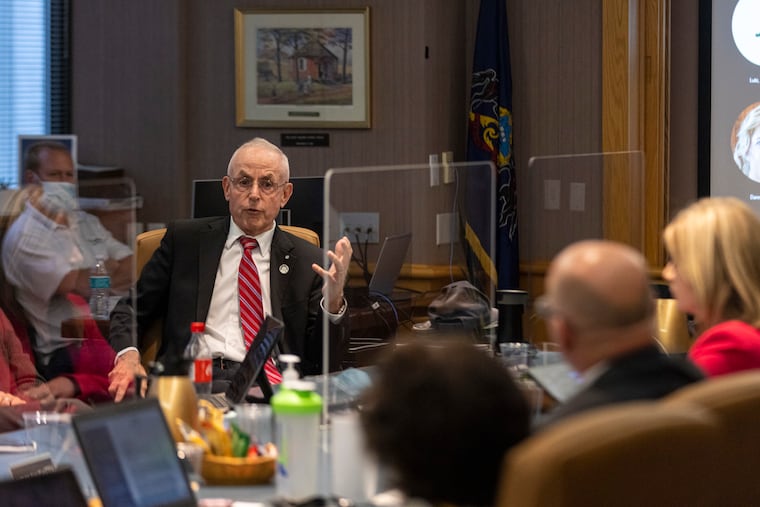The PSERS board once again rejects its staff’s investment advice
This time, only one of 15 PSERS board members went along with the staff recommendation.

For the second time in a month, board members at Pennsylvania’s largest pension fund have rejected a staff investment proposal — and this time almost unanimously.
The PSERS panel voted 14-1 Wednesday night against a recommendation that the plan pump at least another $25 million into one of its largest investments, the YES Communities chain of mobile-home parks. The rejection came after some board members complained that the trailer park chain’s representative had dodged basic questions, while others criticized the Pennsylvania pension plan’s lackluster investments results overall.
The vote was more decisive than the 8-7 tally on Sept. 1 by which the board rejected a call by veteran chief investment officer James H. Grossman Jr. and his staff that the fund put $335 million into a pair of investments marketed by sophisticated outside money managers. That rejection has been a rare event.
The near-unanimous vote Wednesday seemed to mask the degree of animosity among board members, evident in the often sharp exchanges before the rejection. The volunteer panel makes policy for the state Public Schools Employees Retirement System, a $70 billion fund that oversees pensions, current and future, for more than 500,000 working and retired teachers and other current and ex-school workers.
Before the vote, board member Jason Davis, a high school teacher from Western Pennsylvania, gave the panel an ominous warning. He said the fund had been losing admirers on Wall Street as dissidents kept questioning its investment approach.
He quoted Grossman’s staff as saying some outside money managers were even “pulling investments” from PSERS consideration, while others were “looking at getting out from us.” He provided no examples.
This all upset former State Treasurer Joe Torsella, Gov. Tom Wolf’s representative on the board and a longtime leader of the self-styled reform bloc. Hearing “from vendors that opportunities will disappear and relationships will end should be offensive,” Torsella said. “The teachers and school employees of Pennsylvania are the owners of this capital,” not Wall Street money managers.
Board member Richard Vague, Wolf’s banking secretary, said the board had to take a broad look at PSERS investments choices. He and other dissidents on the panel have long argued that the fund needs to put more billions into undramatic, but low-fee index-fund investments and far less into the specialized hedge-fund, venture-capital and real estate plays often recommended by Grossman’s team.
Vague put it this way: The board should “not vote on any of these alternative investments until we have a new asset allocation.”
State Rep. Frank Ryan (R., Lebanon) agreed. Before doubling down on old policies, he said, PSERS needed to carry out “a postmortem for our performance vis-à-vis others.”
He then provided one. Ryan pointed out that the state’s other big pension fund, known as SERS, had posted a 27.8% profit in the last fiscal year, besting the 25% return of the teachers’ plan. SERS, the plan for state workers, is heavily invested in U.S. stocks, rather than the “alternatives” favored by Grossman. (In a recent survey of 50 public pension plans, 23 still reported higher profits than SERS.)
Had PSERS invested along the same lines as SERS, Ryan told his fellow board members, it would be nearly $2 billion richer.
Every billion counts. In this last fiscal year, state taxpayers contributed $3 billion to fund PSERS, local property taxpayers an additional $2 billion, and school workers over $1 billion. Investments generated $12 billion last year.
In July, the board, following the dictates of state law, hiked payroll deductions for teachers and school employees hired since 2011, doing so after the plan fell short of its official investment target. The board took this action after disavowing as inaccurate a previous calculation that had it narrowly clearing the target. Since the spring, the FBI has been investigating that botched calculation, as well as the fund’s real estate purchases near its Harrisburg headquarters.
As for the mobile-home investment, PSERS had already put $600 million into the YES Communities business, a sum Grossman wanted to increase by $25 million or perhaps more. The chain operates 71 parks in 22 states with more than 45,000 homes. It has none in Pennsylvania and New Jersey.
But board member Katie Muth, a Democratic state senator from a district mostly in Chester and Montgomery Counties, grilled the mobile home company’s advocate — a money manager for Stockbridge Capital, a San Francisco real estate investment management firm — about how much the company charged residents.
At one point, she mentioned recent news stories about a disabled grandmother who was to be evicted from her YES Communities park because she hadn’t cut the grass or made timely repairs.
Davis spoke up in the firm’s defense, saying his online search had shown that the Better Business Bureau had given it a good rating. When Davis attempted to cut short Muth’s questioning, suggesting she was being a bully, other members rallied to her side.
Nathan Mains, a board member who heads the state’s association for school boards, said that he and his colleagues had to dig deeper than “a Google search” when investing millions.
Vague backed Muth as well. “I was a little surprised by the number of questions Sen. Muth asked that were not answered,” he said.
In the end, only maverick Eric DiTullio, another representative of school boards, voted in support of the investment.